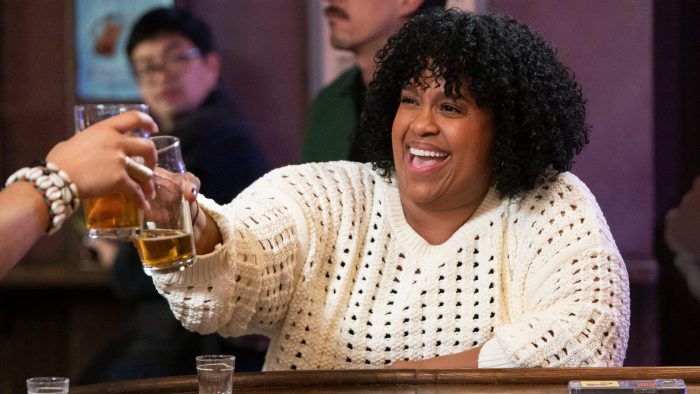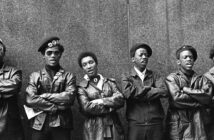Writer-actor Natasha Rothwell, who shot to fame in a supporting role as Kelli on Issa Rae’s HBO show Insecure, steps into the leading role Friday when her new show, How to Die Alone, debuts on Hulu. The show is the first one she has created, produced and starred in with her new production company, Big Hattie Productions.
Rothwell told Andscape that working on the show “confirmed for me that I’m walking in my purpose. It codified my drive, my existence, my passion, and my voice.”
In How to Die Alone, Rothwell plays Melissa, nicknamed Mel, a single, underpaid, debt-ridden airport cart driver who is terrified of flying, love, and her potential. After spending a lonely 35th birthday eating crab rangoon and assembling IKEA-type furniture, Mel has a near-death experience.
Waking up alone in the hospital without an emergency contact to pick her up, Mel meets a single older Black woman in the hospital bed next to her who gives her some sage advice. “Stop caring about what other people think and start doing something that scares you.”
Mel seizes on the advice, deciding to believe she deserves good things and changing her life. She makes more friends, puts herself up for a promotion at work, and tries to find love and herself. “[The show] is an invitation to start living right now. The ordinary can be extraordinary. Your adventure can start right now,” Rothwell said.
Your Andscape September 2024 horoscopeRead now
As a Black woman, Rothwell believes the search for the self is radical. “There’s some days where I get it real right. And there’s some days I get it real wrong, but I think the glory is in the attempt.” One of her inspirations is Sonya Renee Taylor’s book The Body Is Not An Apology: The Power of Radical Self-Love. “Sonya is incredible. She talks about the act of radical self-acceptance and dismantling the systems of oppression that have caused us not to accept ourselves fully.”
Mel’s body is not the focus of the plot of the show. “Mel’s body is not a topic of conversation. It just exists,” Rothwell said. She embraces body neutrality, which “invites us to understand ourselves and others as whole human beings first, and to form our concept of worth, value, and identity around a person’s internal self instead of their external self,” Jessi Kneeland, author of Body Neutral: A Revolutionary Guide to Overcoming Body Image Issues, wrote for Time magazine in 2023.
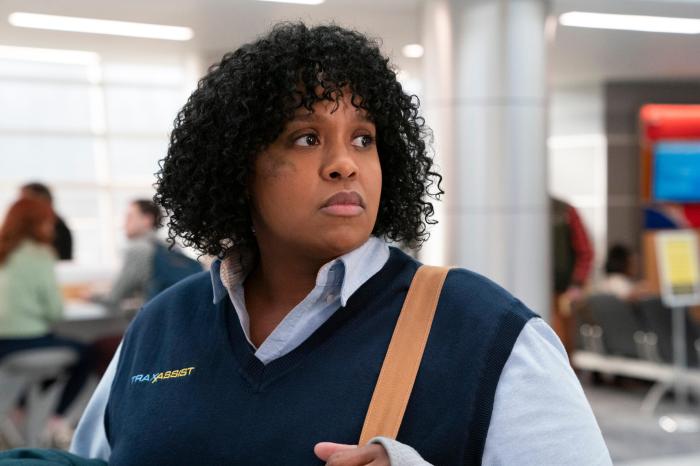 How to Die Alone follows Mel (Natasha Rothwell), who’s never been in love and forgotten how to dream until an accidental brush with death catapults her on a journey to finally take flight and start living by any means necessary.
How to Die Alone follows Mel (Natasha Rothwell), who’s never been in love and forgotten how to dream until an accidental brush with death catapults her on a journey to finally take flight and start living by any means necessary.
Ian Watson/Hulu
Rothwell said this is why she is deliberate about the wording about the show. ‘It’s why I use the word fat. She’s a fat, Black, JFK airport employee who doesn’t know how to fly. That’s in the log line. Putting the word fat in there is to disabuse people of the notion that it’s pejorative. It’s a descriptor. It’s a fact. So welcome. Meet Mel. This is who she is. Let’s keep it pushing.”
The focus on body neutrality in the show gives Mel room to be more complex. Fat Black women are often relegated to the role of funny best friend, comic relief, and therapist in shows. But Rothwell puts herself and Mel at the center of all the characters’ messy, nuanced, imperfect selves — in other words, complete humans. We all need to see someone that looks like us figuring life out.
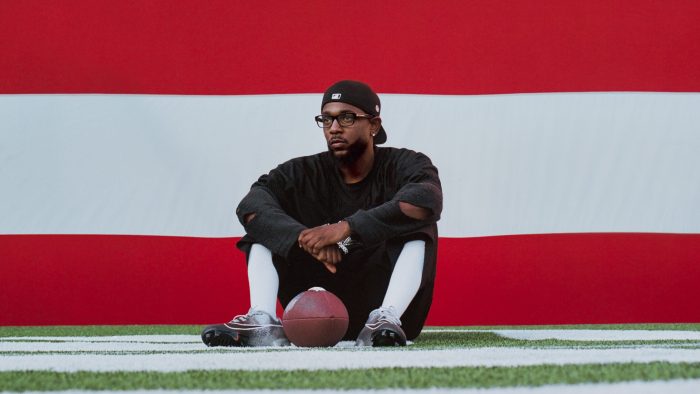 Kendrick Lamar’s Super Bowl halftime show announcement is bigger than his victory over DrakeRead now
Kendrick Lamar’s Super Bowl halftime show announcement is bigger than his victory over DrakeRead now
She’s messy, wanting to improve but showing that she’ll do some morally gray things to get there. The whole show isn’t inspiring montages of a heroine changing her life in the best way, but a woman coming of age, doing it steadily but not always neatly.
In the past, coming-of-age stories focused on teens and people in their early to mid-20s. However, these narratives don’t reflect the reality of so many millennials, who are nearing their 40s or in their 40s and still struggling to figure out finances, family, and love. Financial stability is elusive, dating is harder than ever, and the world feels bleak. With Melissa, Rothwell breathes life into the experience of so many in this generation.
And for lovers of romance, there’s a tender, juicy, and realistic love triangle in the show. But romantic love isn’t Mel’s only goal. Above all, she wants to live a life that, when it ends — as all our lives must — she can be content.
“Societally, we often place a high priority on romantic love,” Rothwell said. “I grew up on rom-coms and all things Disney Princess. In a heteronormative sense, I was supposed to find a knight in shining armor with a white horse.”
It wasn’t until Rothwell started therapy in her early 20s that she began unlearning the idea that happiness is only possible with romance. “For me, there’s a difference between being alone and being lonely.”
“I spent the better part of my 20s scared of the wrong thing. Because dying alone isn’t scary. It’s dying lonely,” Rothwell said. To not be lonely, Rothwell has had to learn to accept love from the places she found it in her life. “I am a recovering people pleaser and a product of that was being this needless wonder who didn’t want to ask for help or even feel like I needed help,” she said. “Luckily, I’ve moved away from that POV [point of view]and my friends have been there for me when I need them. I love the connectivity, people just checking in on me and not wanting anything. It’s a really beautiful thing.”
Rothwell’s embrace of the platonic love in her life, the deprioritizing of romantic love, and the journey toward knowing herself were all healing. “That’s not to say that romantic love isn’t something that I want, but I know my happiness is not dependent on it.”
How to Die Alone is also a workplace comedy, but it is unique in that it takes place at the airport, which is always a site of transitions, forks in the road, decisions, paths forged and roads not taken. The setting lets us understand Mel’s journey of being in limbo. She’s stuck but also — literally and figuratively — only a flight away from changing her life. All she has to do is summon the courage to board.
Rothwell chose the setting because “I wanted to follow the fear and explore something that was really scary to me at the time, which was the thought of dying alone. That theme brought about the opportunity to pick a really interesting location where you can be in a crowd of people but still feel alone.”
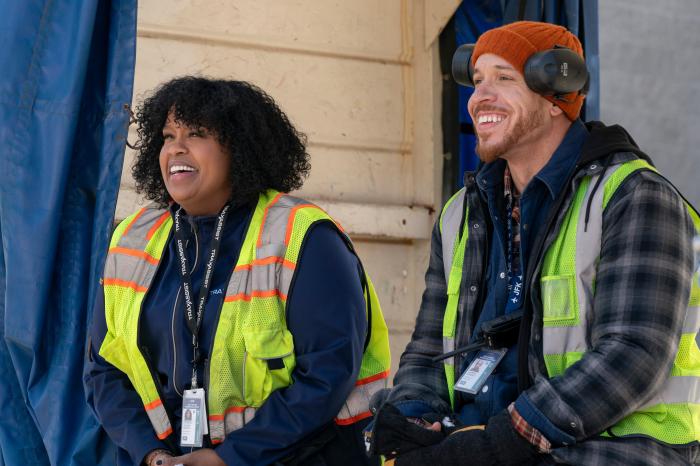 Mel (Natasha Rothwell, left) stars in How to Die Alone, a workplace comedy that takes place in an airport.
Mel (Natasha Rothwell, left) stars in How to Die Alone, a workplace comedy that takes place in an airport.
Disney/John Medland
There’s also the limbo that society imposes upon single people, an expectation that life doesn’t begin until you’re partnered, an ideal Rothwell also had to destroy in her head. “When I first moved to New York in my 20s, I wanted to walk across the Brooklyn Bridge. I was saving it because I wanted to do it for a date,” she said. “I thought it would be such a cool, romantic thing to do, to walk across the bridge and then go to Grimaldi’s pizza. I was holding my breath for that.”
But after starting therapy, she realized she didn’t need to put herself on ice for anyone. “I was like, ‘You know what? I don’t want to save these experiences for someone who isn’t here. I’m here. I can live, I can have these experiences.’ So I took my a– across the bridge, had pizza by myself, and watched the sunset. It was amazing.”
In some ways, Melissa’s leap of faith into a new life mirrors this new iteration of Rothwell’s career, helming her own projects and doing projects with more dimension. Rothwell shows her range in How to Die Alone, with her trademark comedic genius, but also gives us intensely emotional scenes, including moments that show Mel’s darker side that are a pleasure to watch. Her character on Insecure stole hearts, but she was often one-dimensional. Here, we see Rothwell fully, a whole person, a reflection we desperately need.
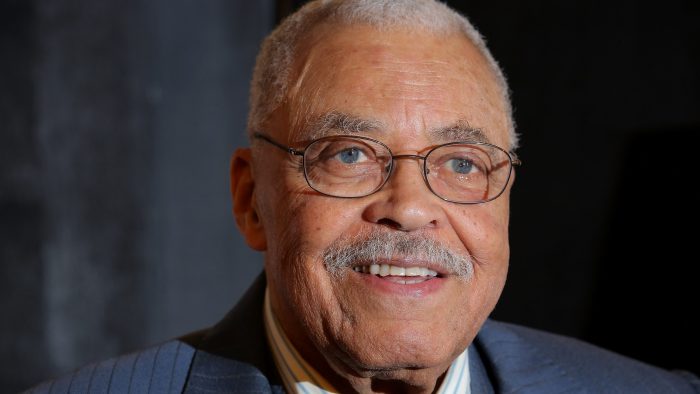 James Earl Jones: The great Black heroRead now
James Earl Jones: The great Black heroRead now
When I asked Rothwell where she thinks the art world is heading for Black women, she is thoughtful. “For me, having an original show helmed by someone who looks like me premiering right now is a radical act of defiance.
“We’re saying to the industry that our stories matter and are worthy and are valuable. A lot of the industry is bound by fiduciary responsibility. I get that, but I think that by not centering our voices, you’re telling our voices aren’t valuable and that we don’t matter when in fact they are and we do.”
Rothwell believes that for things to change, for stories to continue becoming more diverse, “a lot of cis-het white men in the center of a lot of these organizations around town need to have open, frank discussions about the homogeneity of their content.”
Rothwell went into How to Die Alone specifically to dismantle that homogeneity. “All of the directors for my show were women because I made that an intention. There was a 50-50 split genderwise — in the binary sense — on my set because I intentionally set out to do that. None of this stuff magically happens. This is not like sands eroding over the beach over time. You have to go in with a bulldozer and build what we need.”
How to Die Alone is a show so many can relate to. Sometimes, it takes the most terrifying thing we can imagine — such as dying alone — to push us toward conquering fear and finally living. What if we change and we hate it? What if we try to change but fail? And perhaps the greatest, most unspoken fear of all … what if we succeed?
Nylah Iqbal Muhammad is a James Beard Award-nominated writer with bylines in Travel + Leisure, Vogue, and New York Magazine. Her work explores culture, politics, food, and how they intersect, focusing on North American Indigenous, African Diasporic, and South Asian foodways.
